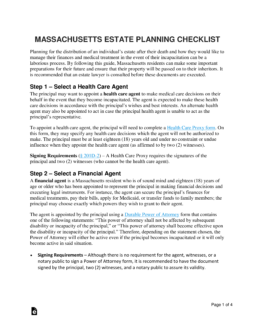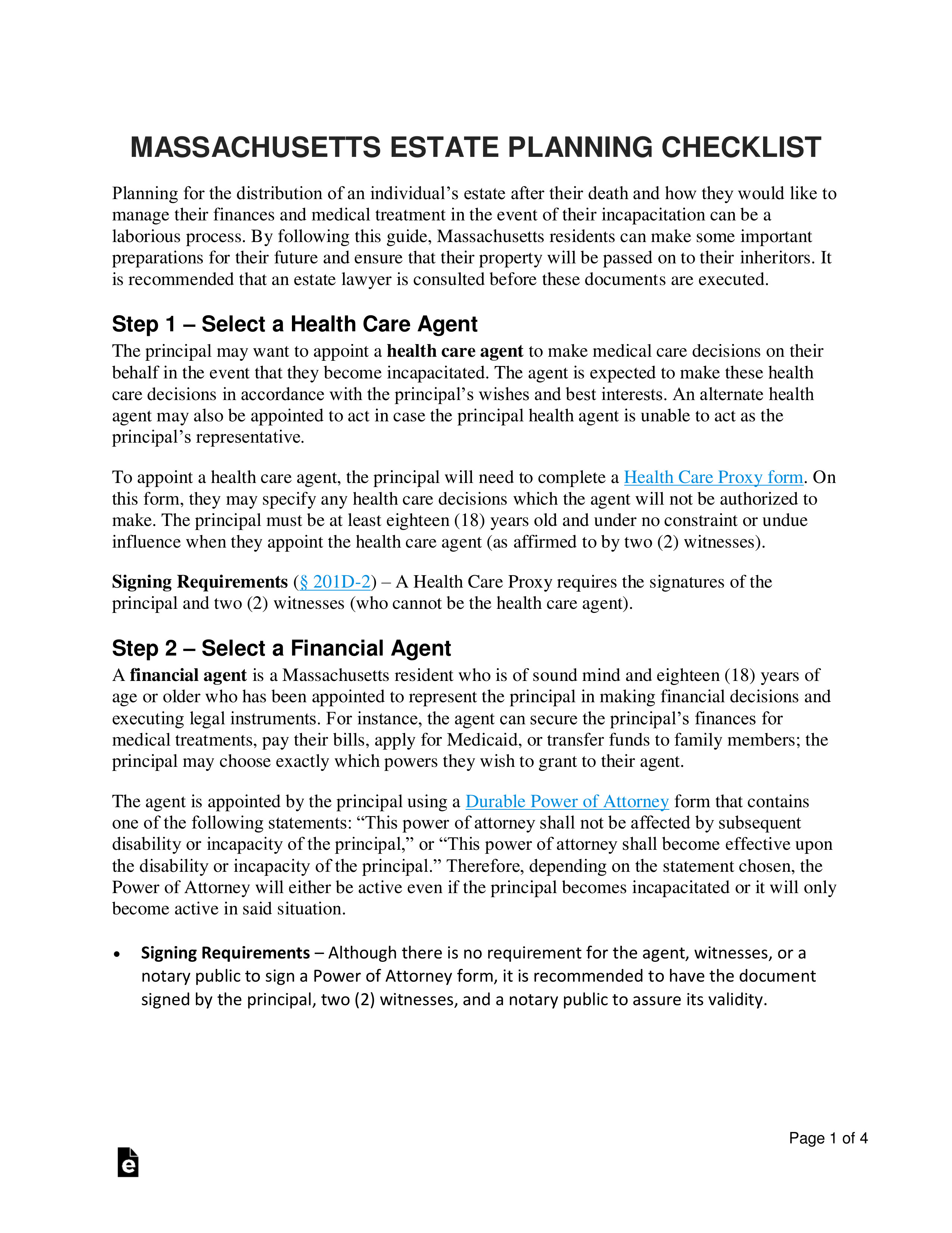Updated March 05, 2024
A Massachusetts estate planning checklist is a guide that reviews some of the most important documents that residents of Massachusetts use when planning for the end of their life or incapacitation. Without executing the necessary legal instruments, an individual cannot guarantee that their property will be inherited by their chosen beneficiaries. In addition to planning the distribution of an individual’s estate via a Last Will and Testament or Revocable Living Trust, the guide also reviews the Health Care Proxy and Durable Power of Attorney which help the individual prepare for the loss of decisional capacity.
How to Create an Estate Plan in Massachusetts (6 steps)
- Select a Health Care Agent
- Select a Financial Agent
- Make a List of All Estate Items
- Designate Beneficiaries and Other Roles
- Execute Estate Transfer Documents
- Keep the Documents Safe
Planning for the distribution of an individual’s estate after their death and how they would like to manage their finances and medical treatment in the event of their incapacitation can be a laborious process. By following this guide, Massachusetts residents can make some important preparations for their future and ensure that their property will be passed on to their inheritors. It is recommended that an estate lawyer is consulted before these documents are executed.
1. Select a Health Care Agent
The principal may want to appoint a health care agent to make medical care decisions on their behalf in the event that they become incapacitated. The agent is expected to make these health care decisions in accordance with the principal’s wishes and best interests. An alternate health agent may also be appointed to act in case the principal health agent is unable to act as the principal’s representative.
To appoint a health care agent, the principal will need to complete a Health Care Proxy form. On this form, they may specify any health care decisions which the agent will not be authorized to make. The principal must be at least eighteen (18) years old and under no constraint or undue influence when they appoint the health care agent (as affirmed to by two (2) witnesses).
Signing Requirements – A Health Care Proxy requires the signatures of the principal and two (2) witnesses (who cannot be the health care agent).[1]
2. Select a Financial Agent
A financial agent is a Massachusetts resident who is of sound mind and eighteen (18) years of age or older who has been appointed to represent the principal in making financial decisions and executing legal instruments. For instance, the agent can secure the principal’s finances for medical treatments, pay their bills, apply for Medicaid, or transfer funds to family members; the principal may choose exactly which powers they wish to grant to their agent. The agent is appointed by the principal using a Durable Power of Attorney form that contains one of the following statements: “This power of attorney shall not be affected by subsequent disability or incapacity of the principal,” or “This power of attorney shall become effective upon the disability or incapacity of the principal.” Therefore, depending on the statement chosen, the Power of Attorney will either be active even if the principal becomes incapacitated or it will only become active in said situation.
- Signing Requirements – Although there is no requirement for the agent, witnesses, or a notary public to sign a Power of Attorney form, it is recommended to have the document signed by the principal, two (2) witnesses, and a notary public to assure its validity.
Financial Powers Allowed:
- To receive and deposit funds in any financial institution, and to withdraw funds by check or otherwise to pay for goods, services, and any other personal and business expenses for the principal’s benefit. If necessary to effect the principal’s attorney-in-fact’s powers, the principal’s attorney-in-fact is authorized to execute any document required to be signed by such banking institution.
- To have access at any time or times to any safe-deposit box rented by the principal or to which the principal may have access, wheresoever located, including drilling, if necessary, and to remove all or any part of the contents thereof, and to surrender or relinquish said safe-deposit box; and any institution in which any such safe-deposit box may be located shall not incur any liability to the principal or the principal’s estate as a result of permitting the principal’s attorney-in-fact to exercise this power.
- To make loans in the principal’s name; to borrow money in the principal’s name, individually or jointly with others; to give promissory notes or other obligations therefor; and to deposit or mortgage as collateral or for security for the payment thereof any or all of the principal’s securities, real estate, personal property, or other property of whatever nature and wherever situated, held by the principal personally or in trust for the principal’s benefit.
- To apply for and receive any government benefits for which I may be eligible become eligible, including but not limited to, Social Security, Medicare, and Medicaid.
- To contribute to, select payment option of, roll-over, and receive benefits of any retirement plan or IRA the principal may own, except the principal’s attorney-in-fact shall not have the power to change the beneficiary of any of the principal’s retirement plans or IRAs.
- To complete and sign any local, state and federal tax returns on the principal’s behalf, pay any taxes and assessments due and receive credits and refunds owed to the principal and to sign any tax agency documents necessary to effectuate these powers.
- To purchase, pay premiums and make claims on life, health, automobile and homeowners’ insurance on the principal’s behalf, except the principal’s attorney-in-fact shall not have the power to cash in or change the beneficiary of any life insurance policy.
- To acquire, purchase, exchange, lease, grant options to sell, and sell and convey real property, or any interests therein, on such terms and conditions, including credit arrangements, as the principal’s attorney-in-fact shall deem proper; to execute, acknowledge and deliver, under seal or otherwise, any and all assignments, transfers, deeds, papers, documents or instruments which the principal’s attorney-in-fact shall deem necessary in connection therewith.
- To acquire, purchase, exchange, lease, grant options to sell, and sell and convey personal property, or any interests therein, on such terms and conditions, including credit arrangements, as the principal’s attorney-in-fact shall deem proper; to execute, acknowledge and deliver, under seal or otherwise, any and the principal’s attorney-in-fact shall deem necessary in connection therewith; to purchase, sell or otherwise dispose of, assign, transfer and convey shares of stock, bonds, securities and other personal property now or hereafter belonging to the principal, whether standing in the principal’s name or otherwise, and wherever situated.
- To make gifts, grants, or other transfers (including the forgiveness of indebtedness and the completion of any charitable pledges the principal may have made) without consideration, either outright or in trust to such person(s).
3. Make a List of All Estate Items
4. Designate Beneficiaries and Other Roles
5. Execute Estate Transfer Documents
The most important document in estate planning is the legal instrument that transfers an estate owner’s property to their inheritors. There are two (2) options which are most commonly employed to accomplish this (although they are not the only options).
Last Will and Testament – This legal instrument allows individuals to give instructions on how their estate should be divided, as well as any other final instructions that the principal (the “settlor”) may have (burial, funeral, etc.).
- Signing Requirements – Must be signed by the principal or at their direction and in their conscious presence. Two (2) witnesses must also sign after witnessing the principal’s signature. All three (3) parties should also acknowledge their signatures before a notary public who will also sign.[2]
Revocable Living Trust – Using this option allows the principal (the “grantor”) to bypass the probate court process by signing the ownership of their property over to a Trust. While the grantor lives, they will still be able to use their assets and benefit from them.
- Signing Requirements – Although there are no current statutes regarding signing requirements for Trusts, it is still recommended that a Living Trust should be signed by the principal, two (2) witnesses, and a notary public. Any appointed trustees should sign as well.[3]
6. Keep the Documents Safe
Massachusetts Estate Planning Laws
- Advance Health Care Directive – Chapter 201D – Health Care Proxies
- Durable Power of Attorney – § 5-501
- Last Will and Testament – Article II – Intestacy, Wills, and Donative Transfers
- Living Trust (Revocable) – Article 4 – Creation, Validity, Modification, and Termination of Trust


